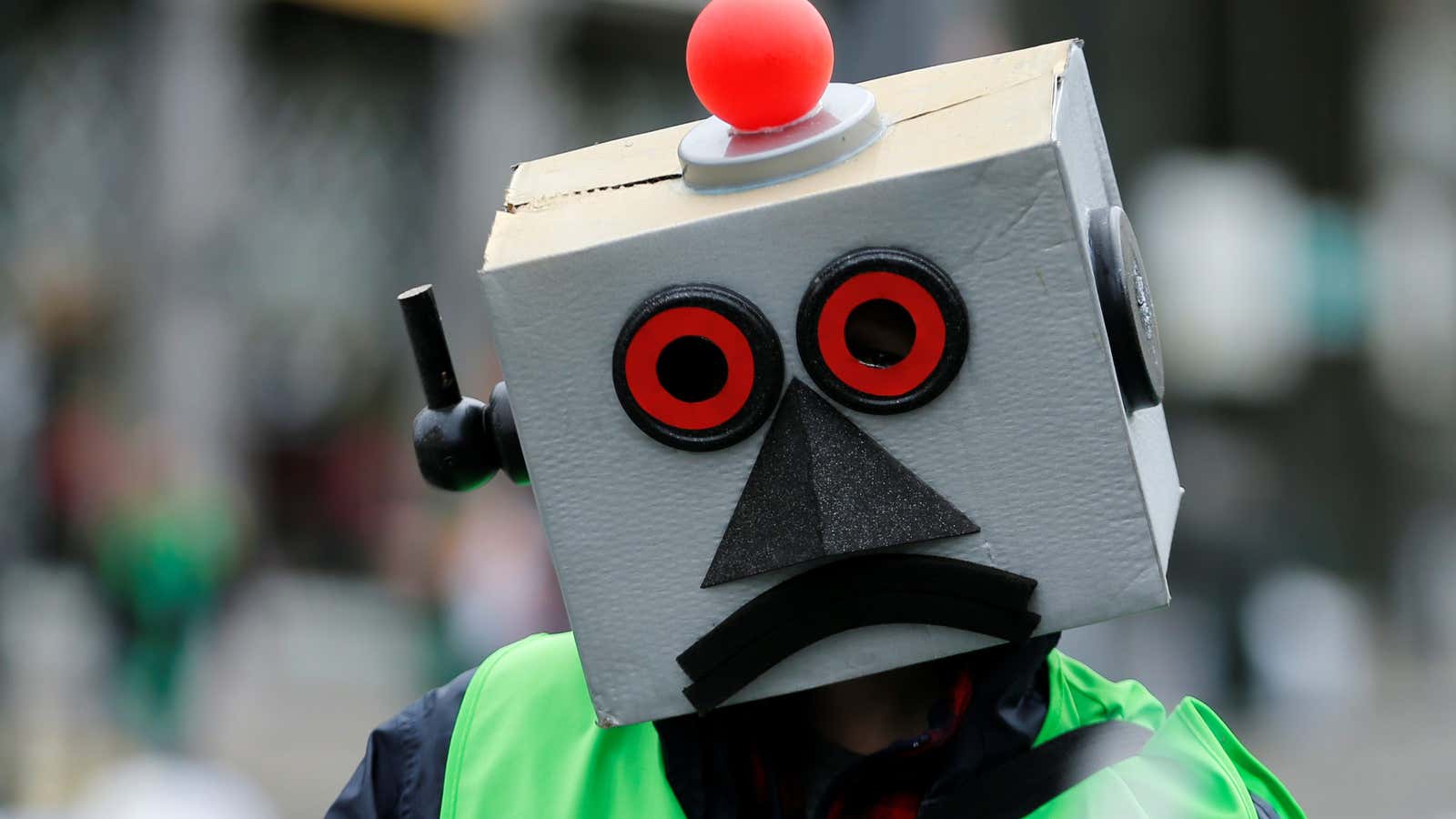If being swapped out for a robot is keeping you up at night, don’t panic yet: According to a new analysis from McKinsey, less than 5% of global occupations could be fully automated using current technology.
McKinsey analyzed 2,000 different work activities across 800 occupations and, and on the whole, characterized automation as something that will change almost every job, but not render human workers useless. Among its findings:
Robot work is the new grunt work
Although the vast majority of jobs still require some human intelligence, all jobs contain tasks that can currently be automated. Specifically, McKinsey found that, at about 60% of occupations, 30% of tasks could be handed over to robots. “More occupations will change,” the report concludes, “than will be automated away.”
We could automate $16 trillion in global wages right now
McKinsey notes that jobs comprised of physical activities in highly structured and predictable environments—common in industries like manufacturing, hospitality, food service, and retail—as well as jobs involving the collection and processing of data, are most susceptible to automation. In its analysis of 2,000 job tasks, McKinsey discovered that almost half of activities that workers do globally—accounting for about $16 trillion in wages—could be automated using technology that has already been demonstrated today.
Automating those tasks will change the daily work activities of just about everyone, but much has to happen first. For example, technology needs to become more affordable when compared to the cost of labor. While McKinsey predicts that about half of job activities could be automated by 2055, it also gave that prediction a 20-year margin of error, depending on various factors.
The [owners of the] machines will rise
McKinsey’s analysis did not find hourly wage to be a predictor of automation potential, meaning that the robot task-takeover will impact workers across all pay levels. But it did warn that automation could cause labor displacement, income inequality, and depressed wages in industries. That’s not because humans become useless, but because the owners of the machines stand to benefit most from increased productivity.
Your boss might have more time for you
A majority of average workers may be able to hand over a third of their job to robots right now, but chief executives don’t fare much better. According to McKinsey, about 25% of a CEO’s daily activities can be automated by current technology.
Don’t start eyeing your boss’s office yet, though; CEOs aren’t going to disappear. More likely, as it becomes cheap and practical to automate tasks like analyzing reports and preparing staff assignments, McKinsey suggests CEOs will spend more time developing workers and making creative decisions.
We need every erg
The study’s authors predict that automation could grow global GDP between 0.8% and 1.4% annually, which is crucial—many economies need that growth to combat the effects of their shrinking workforce.
“While much of the current debate about automation has focused on the potential for mass unemployment, predicated on a surplus of human labor,” McKinsey writes, “the world’s economy will actually need every erg of human labor working, in addition to the robots, to overcome demographic aging trends in both developed and developing economies.
“In other words, a surplus of human labor is much less likely to occur than a deficit of human labor, unless automation is deployed widely.”
It will probably all work out
The automation scenario has played out before. In the 19th century, Marxists were convinced that the invention of the power loom would make weavers obsolete. Instead, when it became easier for humans to make cloth, cloth became cheaper. Demand increased, and more loom workers got jobs. Likewise, the introduction of the ATM led to more bank branches and more bank tellers. The Excel spreadsheet did not replace the accountant. Automated-trading software helped turn brokers into wealth managers.
McKinsey is appropriately circumspect about whether modern automation will follow that pattern, writing, “We cannot definitively say whether historical precedent will be upheld this time.” But if history does repeat itself, new tasks and new jobs will be created with advances in technology, even as other tasks and professions become automated.
